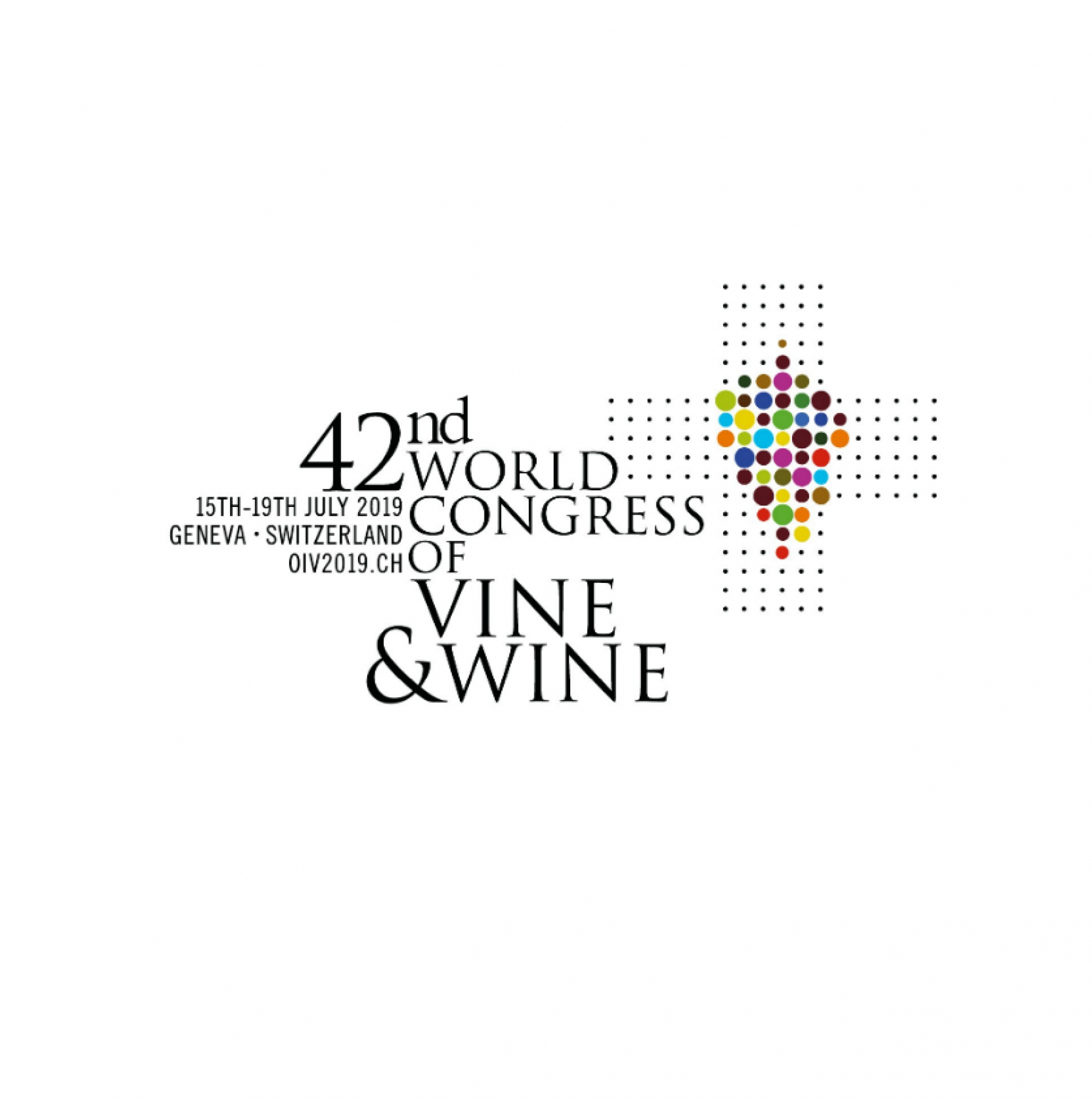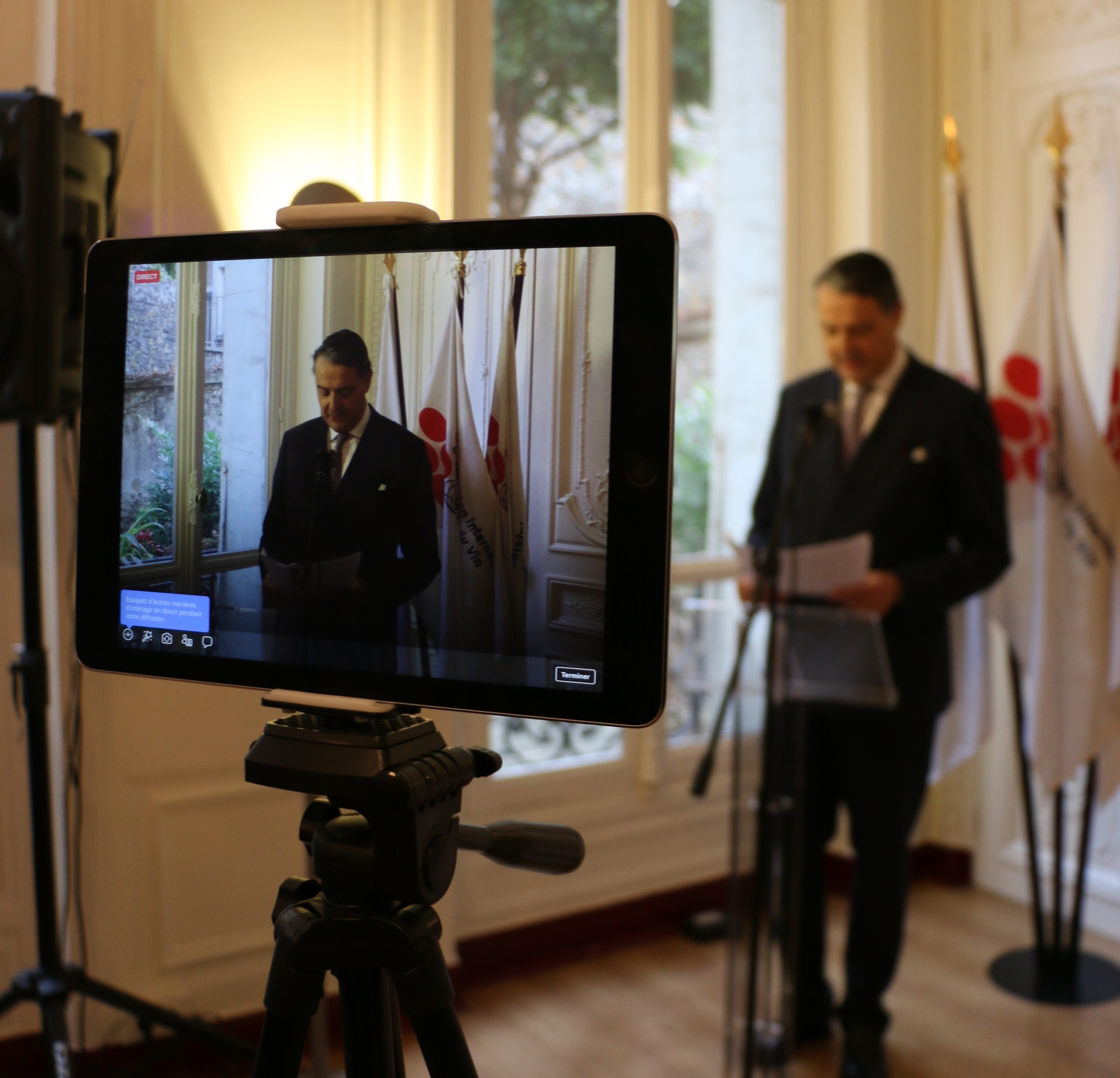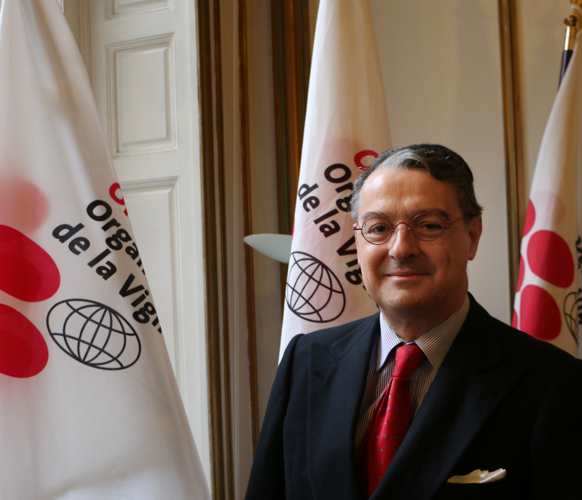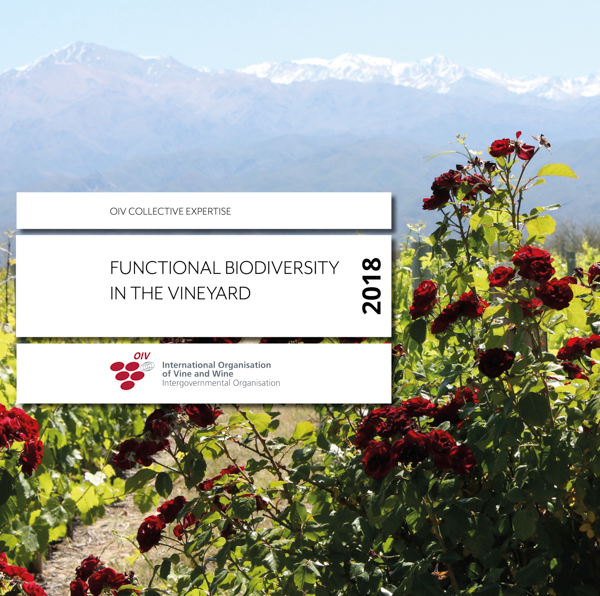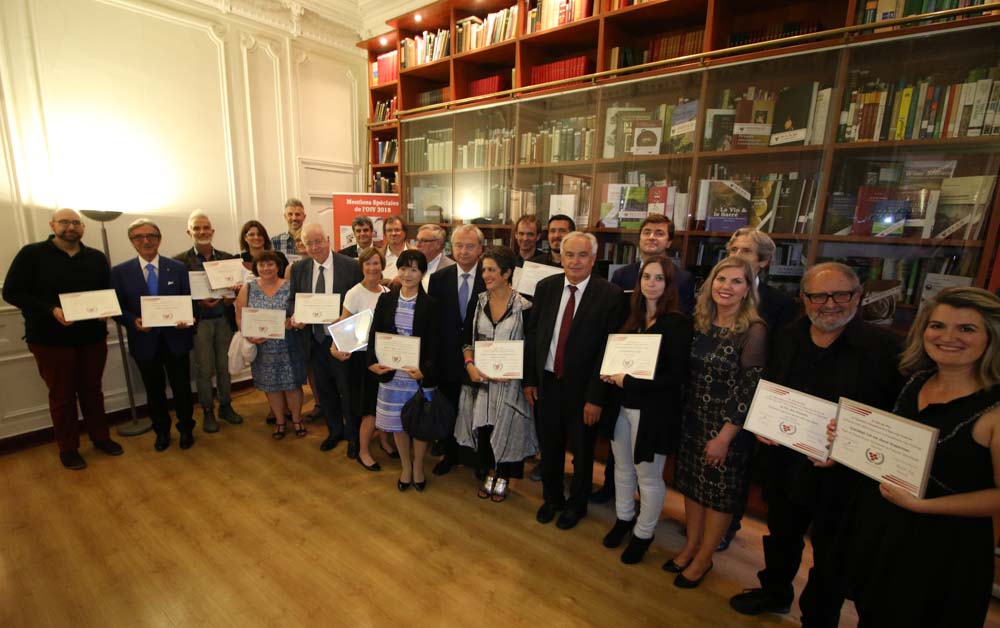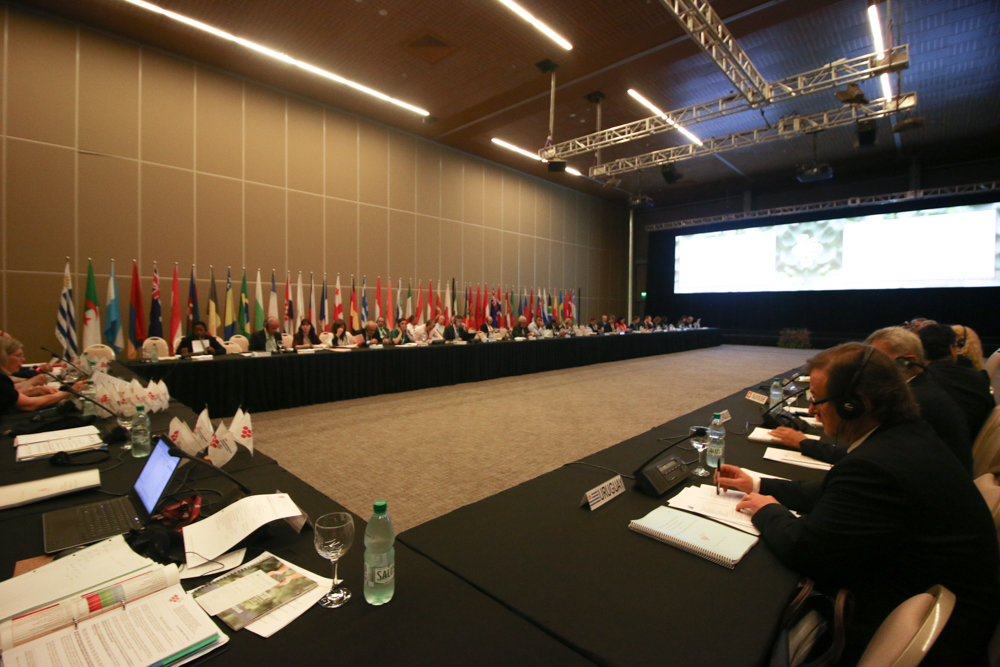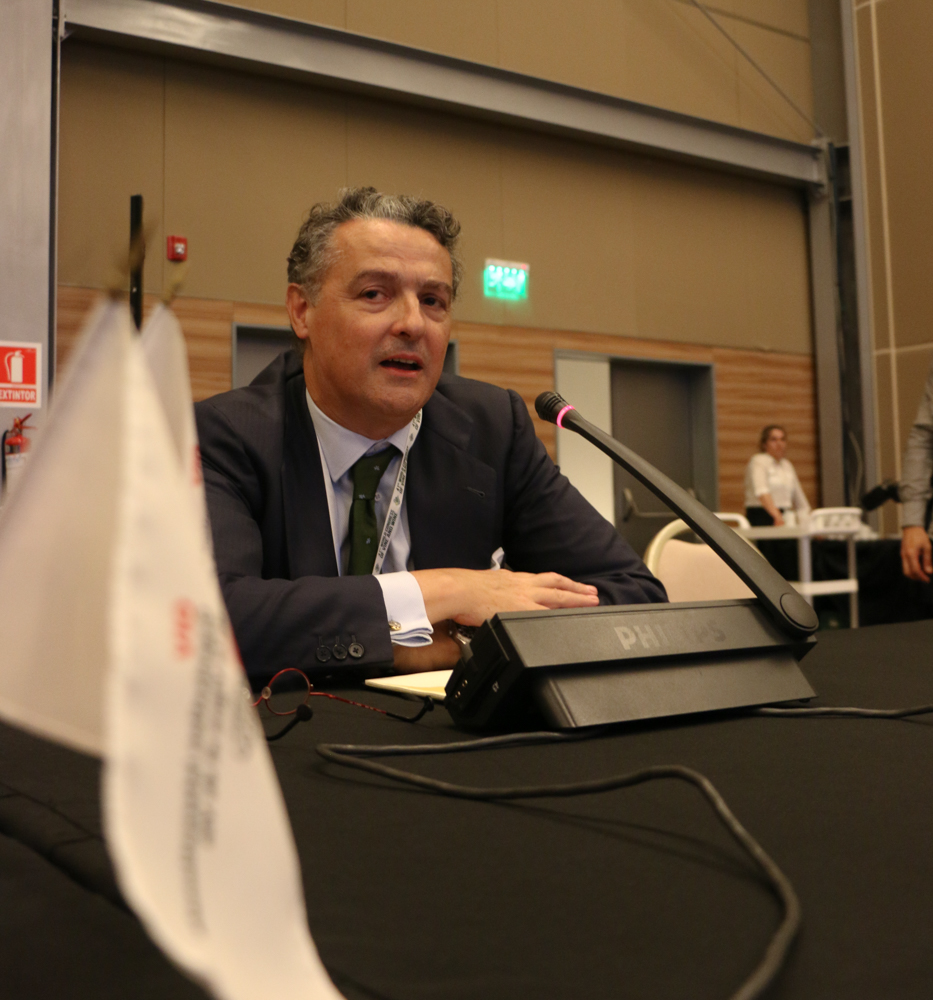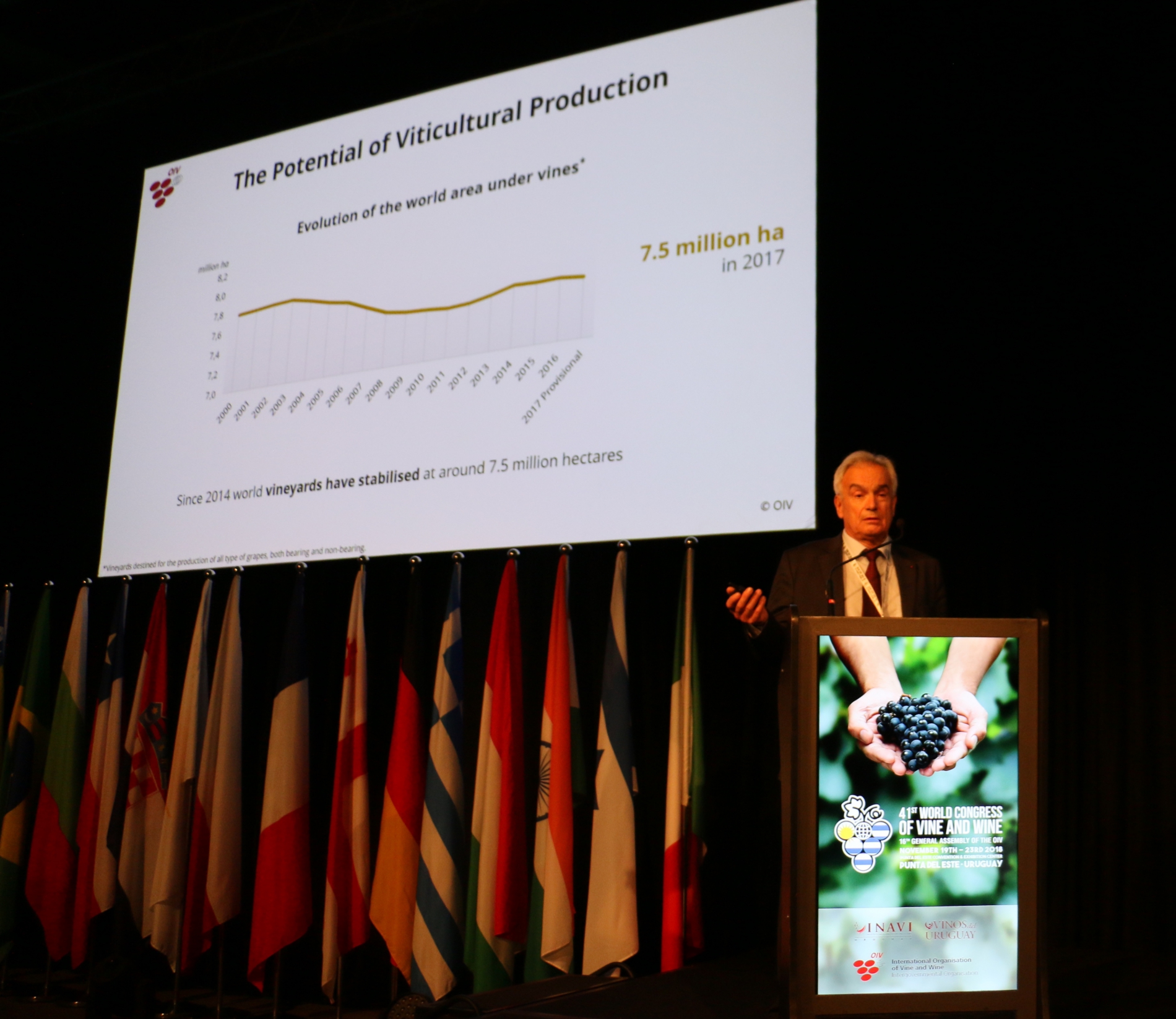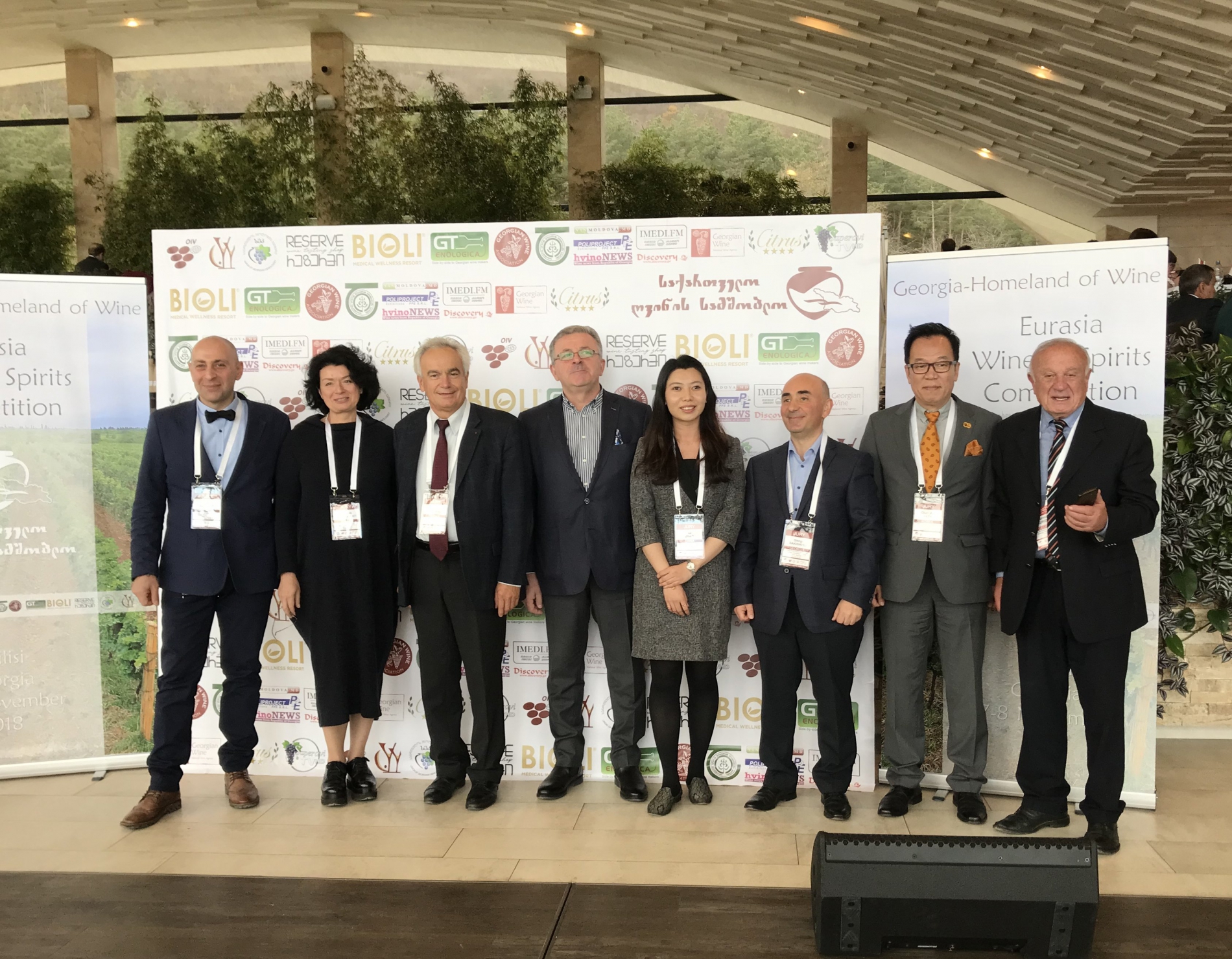17 Jan 2019
The Director General and the President had working meetings to launch the first logistical stages and to visit the International Conference Centre Geneva (CICG), which will host the experts and delegates participating in the 42nd OIV Congress. They were welcomed by the Swiss Organising Committee, including President Simone de Montmollin, Vice-President Dominique Maigre, Scientific Committee President François Murisier, and Head of the Swiss Delegation to the OIV Pierre Schauenberg.From left to right: François Murisier, Pierre Schauenberg, Simone de Montmollin, Pau Roca, Regina Vanderlinde, Yann JubanPreservation and innovation: expectations at the environmental, economic and social levelThe next OIV Congress will address issues concerning sustainability through the following theme: ‘Preservation and innovation: expectations at the environmental, economic and social level’. Scientific papers must be submitted via the Congress’ online submission platform. The deadline for the submission of abstracts is 3 March 2019.Registration for the Congress is now open on the official website of the 42nd World Congress of Vine and Wine. An exceptional opportunity for Congress participantsThe Fête des Vignerons winegrowers’ festival will take place in the evening of Friday 19 July 2019. This event pays homage to the centuries-old winegrowing traditions of an entire region through a show, organised by the Confrérie des Vignerons. Recognised by UNESCO as intangible cultural heritage, this celebration, unique in the world, takes place once a generation in Vevey, a town situated in the heart of the Lavaux vineyards in the canton of Vaud.Those who register for the Congress will be eligible for a discount between 40 and 50% on the entry fee for this evening show. Due to limited seating capacity, we recommend you register here as soon as possible to secure your place.The entry fee includes return transport between Geneva and Vevey.
15 Jan 2019
The ceremony, which coincided with the commencement of his duties, represents ‘a new phase’, with Pau Roca feeling ‘responsible for the whole team, and each of the countries in the OIV’. In his address, Pau Roca emphasised the role of new technologies and new modes of communication, which in his view ‘are moving us forward at a rate of constant acceleration’. In this regard, ‘neither the wine sector nor the Organisation itself can stand by and witness these phenomena without becoming deeply involved and integrating these innovations and new tools’. For the Director General of the OIV, ‘the universalised use of these technologies will radically change the economy and legal relations. New ways to encrypt, store and transfer information, to validate authority, and to secure and distribute databases and metadata, will dramatically change our environment.’ Pau Roca feels ‘responsible for the whole team, and each of the countries in the OIV’The OIV Strategic PlanWith over a 100 million hectolitres in wine exports, representing a value of more than EUR 30 billion, the proportion of cross-border trade in relation to production is a key success factor for the wine sector. On this point, Pau Roca reiterated the OIV’s mission to reinforce and maintain the balance between the consumer and producer markets. To this end, the Organisation should guarantee that ‘regulations never become an excuse to erect barriers and generate confrontation; rather, they should serve consumers and the interests of producers in a balanced and shared value chain, while ensuring the preservation of pluralism and diversity’. The OIV’s future five-year plan must address the challenges of the sector. In 2019, the Organisation will develop its next Strategic Plan. Pau Roca wishes to propose to the OIV Member States a strategy focused on a number of priority areas, such as:
- to contribute to efforts directed at ensuring not only the environmental sustainability, but also the social, economic and cultural sustainability of our sector,
- to stay informed and to prepare for adaptation to the digitisation of the sector and its information systems, at an appropriate pace and identifying all the processes that are likely to change,
- to offer to OIV Member States a service that ensures the economic development of production and trade by providing good regulatory and administrative practices.
13 Jan 2019
Pau Roca has been a Spanish delegate to the OIV since 1992 and was President of the “Law and Consumer Information” (DROCON) Expert Group between 2010 and 2016, as well as Vice-President of the “Sustainable Development and Climate Change” Expert Group between 2016 and 2018. A Francophone and Anglophone polyglot, Pau Roca has specific, in-depth knowledge of the global vitivinicultural sector and expertise acquired at the head of the Spanish Wine Federation (FEV), which he managed for over 20 years. The new Director General has had a diversified professional career, having gained experience in the olive oil sector and started out in scientific research in oceanography. See Pau Roca’s full CV.With the President of the Organisation, Regina Vanderlinde, the new OIV Director General already has a meeting scheduled with the Organising Committee of the 42nd World Congress of Vine and Wine, in addition to a visit to the site for the Congress in Switzerland. This week will also be an opportunity to present the OIV’s commitments for 2019 to representatives from the Diplomatic Corps, administrations and professionals in the vitivinicultural sector. Pau Roca, elected during the 16th OIV General Assembly held in Punta del Este (Uruguay) on 23 November 2018, has assumed his role as Director General of the OIV for a five-year term
01 Jan 2019
The new OIV collective expertise report “Functional biodiversity in the vineyard” presents an overview about functional biodiversity in vineyards and tries to illustrate the major aspects of functional biodiversity in the viticultural sector as:
- Why enhancement of biodiversity and on what extent is beneficial for the vineyard?
- Identify and illustrate different ecological infrastructures existing in the vineyards;
- Identify and illustrate major mechanisms of interactions between species or group of species;
- Identify and illustrate how these interactions can be used for the benefit of the vineyard.
10 Dec 2018
Each year, the OIV calls upon the skills of numerous people and specialists from around the world to read and evaluate submissions on vine and wine according to specific criteria for the OIV Awards.Each work is evaluated by several readers of different nationalities.Would you like to be one of our reader-evaluators?Or have you already been a reader for the OIV Awards and would like to do it again?Contact the OIV Award Jury Secretariat at jurydesprix@oiv.int before 28 February 2019.Important note: If you are an author, contributor or coordinator of a work presented for the OIV Awards in 2019, you cannot evaluate another submission.If your profile (profession, nationality, working language(s), skills, specialities, etc.) meet the requirements to evaluate one or several works, the Award Jury Secretariat will contact you by email in March 2019.
29 Nov 2018
Decisions on Viticulture and the Environment
- In the field of viticulture, the OIV adopted a recommendation to encourage research and study relating to the use of plant extracts, specific sustainable fertilisers, hormones, agronomic practices and chemical products as alternatives to synthetic dormancy-breaking products used in table grape production (Resolution OIV-VITI 607-2018).
- A recommendation to encourage research and study relating to the use of biological-control agents, anti-microbial natural plant extracts, physical agents or treatments for sustainable decontamination and agronomic solutions as alternatives to sulphites and other preservatives in the production of table grapes and dried grapes (Resolution OIV-VITI 608-2018).
- OIV Protocol for the sustainable use of water in viticulture (Resolution OIV-VITI 569-2018). This protocol defines good water management practices based on sustainability principles, taking into account the consequences of limited supply of water in some areas or regions and in some years, as well as the need to ensure its more efficient use in vitivinicultural production. Sustainable use of water can be achieved through the appropriate selection and management of the vineyard, planting material, soil and cover crop, as well as by ensuring the availability of appropriate and timely water supply, by limiting losses as much as possible.
- The OIV adopted a recommendation on OIV good practices for the minimisation of the impacts associated with plant protection product application in vineyards (Resolution OIV-VITI 592-2018). These good practices constitute the basis for reasoned use of the optimum plant protection products and technical recommendations relating to the application of these products in the vineyard. The criteria suggested are based on the different official protocols enacted by OIV Members and are intended to reduce as far as possible the risks for humans and the environment, within the framework of responsibility and sustainability. These guidelines should be revised periodically.
- The OIV has continued work on the differentiation of substances already permitted by the OIV from substances used as additives or as processing aids, particularly with regard to glutathione (Resolution OIV-OENO 567B1-2018) and tannins (Resolution OIV-OENO 567C-2018). This distinction will help to establish better harmonisation among the international organisations and to facilitate the international trade of grape wines.
- The monograph on the determination of hemicellulase activity in enzymatic preparations (Resolution OIV-OENO 573-2018). Hemicellulases catalyse the degradation of hemicelluloses. The hemicelluloses of the cell walls of grape berries are mainly composed of xyloglucans and arabinoxylans; these two polysaccharides represent nearly 90% of grape hemicelluloses. The hemicellulase activity of enzymatic preparations is evaluated by measuring the 1,4 -ß -xylanase activity. Enzymatic preparations containing hemicellulase activities are used during grape maceration, and in the clarification and improvement of the filterability of musts and wines.
- The monograph on potassium carbonate (Resolution OIV-OENO 579-2018), which may be used for the deacidification of musts and wines. Detailed specifications accompany this monograph, including that the product intended for oenological applications should contain a minimum of 98% potassium carbonate.
- The monograph on yeasts with guaranteed glutathione levels (Resolution OIV-OENO 603-2018), which supplements the oenological practice. Glutathione is used for its antioxidant properties that can fight against oxidation phenomena in musts and wines and protect aromatic compounds. Detailed specifications accompany this monograph, including those regarding the reduced glutathione, cysteine and gamma-glutamylcysteine contents.
- A revision of the monograph on oenological carbon, relating to the level of ashes when the carbon is agglomerated with bentonite (Resolution OIV-OENO 604-2018).
- The update of the method for the determination of sulphur dioxide, distinguishing the method for the determination of free sulphur dioxide, a Type IV method (Resolution OIV-OENO 591A-2018) from that for the determination of total sulphur dioxide, a Type II method (Resolution OIV-OENO 591B-2018). The principle of these methods is based on the entrainment of sulphur dioxide by a current of air or nitrogen; it is fixed and oxidised by bubbling through a dilute and neutral solution of hydrogen peroxide. The sulphuric acid formed is determined by titration with a standard solution of sodium hydroxide.
- The method for the determination of ethanal in wines was adopted (Resolution OIV-OENO 595-2018). The method described is suitable for the determination of the total (free and sulphur-dioxide-bound) ethanal in wines for concentrations of between 0.2 and 80 mg/L. The analyte is identified by derivatisation of the molecule with 2,4-dinitrophenylhydrazine (DNPH) followed by elution using the HPLC technique. Detection is evaluated using the retention time at the wavelength of 365 nm.
- The update of the method for the determination of total acidity in vinegars (Resolution OIV-OENO 597-2018). The principle of this method is based on the neutralisation of acids in sample by alkaline solution. The modification made consists of ensuring that the water used is free from CO2, which produces an acidic reaction and could influence the final result of the titration.
- The method for the determination of L-lactic acid in wines by specific enzymatic analysis using an automatic sequential analyser (Resolution OIV-OENO 598-2018). This method is characterised on a scale of measurement of 0.06 to 1.43 g/L. The principle of this Type III method is based on the reaction of nicotinamide adenine dinucleotide (NAD) with L-lactic acid, which is oxidised to pyruvate. The pyruvate formed is then converted into L-alanine in the presence of L-glutamate. The reduced nicotinamide adenine dinucleotide (NADH) produced is measured thanks to its absorption at 340 nm. It is proportional to the quantity of L-lactic acid.
- The method for the determination of L-malic acid in wines by specific enzymatic analysis using an automatic sequential analyser (Resolution OIV-OENO 599-2018). This method is characterised on a scale of measurement of 0.12 to 2.30 g/L. The principle of this Type III method is based on the reaction of nicotinamide adenine dinucleotide (NAD) with L-malic acid, which is oxidised to oxalate. The oxaloacetate formed is then converted into L-aspartate in the presence of L-glutamate. The reduced nicotinamide adenine dinucleotide (NADH) produced is measured thanks to its absorption at 340 nm. It is proportional to the quantity of L-malic acid.
- The method for the determination of the total D-glucose + D-fructose in wines by specific enzymatic analysis using an automatic sequential analyser (Resolution OIV-OENO 600-2018). The method is characterised on a measurement range of 0.1 to 96.31 g/L, taking into account the introduction of a dilution of the sample beyond 5 g/L. The principle of this Type III method is based on the reaction of nicotinamide adenine dinucleotide phosphate (NADP) with glucose-6-phosphate, which is oxidised to gluconate-6-phosphate. The quantity of reduced nicotinamide adenine dinucleotide phosphate (NADPH) produced directly correlates with that of glucose-6-phosphate and thus with that of D-glucose. Fructose-6-phosphate (F6P) is converted into glucose-6-phosphate (G6P) in the presence of phosphoglucose isomerase (PGI), which is oxidised according to the previous reaction. The reduced nicotinamide adenine dinucleotide phosphate (NADPH) produced is measured by way of its absorption at 340 nm.
- The update of the method of analysis of volatile compounds in wines by gas chromatography (Resolution OIV-OENO 606-2018). This update consists of integrating the results of the inter-laboratory test carried out and classifying the types of methods according to the compounds considered.
- The update of the method for the determination of releasable 2,4,6-trichloroanisole in wine by cork stoppers (Resolution OIV-OENO 623-2018). The modification made concerns the quantity of sodium chloride that may be added in order to increase the effectiveness of extraction and the sensitivity of the method according to the potential matrix effects that may occur. Similarly, a selection of specific ions for quantification by mass spectrometry was specified.
- Finally, the OIV adopted an update of the decision tree for toxicological evaluation of processing aids and additives used in vine products (Resolution OIV-SECSAN 627-2018). This update was developed with a view to its use during the adoption procedure for an oenological practice involving processing aids or additives.
23 Nov 2018
During the 16th General Assembly of the OIV in Punta del Este (Uruguay), the 47 Member States of the OIV have elected the next Director General of the OIV for a 5 year mandate from 2019-2023. Pau Roca Blasco (Spain), currently the Secretary General of the Spanish Wine Federation, has been chosen to become the 10th Director of the OIV and to lead the Organisation towards the celebration of its centenary.The first course of action Mr. Blasco has indicated is the creation of the new OIV Strategic Plan (2019-2024) via the expertise of OIV Experts, with which he is familiar being a member of the Spanish delegation since 1996 and also having served as the President of the Law and Consumer Information Experts Group. Pau Roca Blasco
18 Nov 2018
The report covers the areas under vines, grape production, wine production and consumption, and wine import and export volumes.
- In 2017, the world area under vines rose to 7,534 kha.
- Global grape production reached 73 mt in 2017.
- 2018 world wine production (excluding juice and musts) is estimated at 279 mhl.
- 2017 world wine consumption is estimated at 244 mhl.
12 Nov 2018
Organised by the Union of Georgian Oenologists, with support from the National Wine Agency of Georgia and technical assistance from Poliproject Exhibitions (Moldova), this competition, which was placed under the patronage of the OIV, brought together 200 samples of wine and spirits from 12 countries.During the opening ceremony, the Georgian Minister for Agriculture, Mr Levan Davitashvili, emphasised his country’s efforts to develop and modernise its vitivinicultural sector, with this competition presenting a timely opportunity to demonstrate Georgia’s ambitions in this field. These aspirations are expressed through the slogan, ‘Georgia – Homeland of Wine’. The Director General of the OIV, during an interview with the Minister, recalled the OIV’s contribution to the Georgian authorities’ efforts, notably through the hosting of a presentation of Georgian wines each year at the Organisation's headquarters in Paris, and also through the initiative begun in 2017 that aims to define the white wines made using the traditional Qvevri method.In addition, Jean-Marie Aurand praised the active presence of Georgian experts in the Organisation's scientific work, with some of these experts having already taken on responsibilities within the expert groups.Thousands of years of history The Georgian vitivinicultural sector comprises more than 600 businesses, which produce more than 900,000 hL of wine, nearly 50% of which is exported.Georgian wine production has a long history dating back thousands of years. The first traces of the cultivation of vines go back 8000 years, and in Georgia some wines are made using a traditional winemaking process (the Qvevri method, included on the UNESCO World Heritage List). There are over 500 native Georgian varieties, of which around 30 are currently cultivated, that create wines with strong typicity. The best-known varieties are Saperavi for reds, and Rkatsiteli or Mtsvane for whites. In the 19th century, Georgian wines were the “wines of the Court of the Tsars”. After the purely quantitative strategy of the Soviet period, Georgian viticulture began a process of profound reorientation towards quality: a new legislative framework has made vitivinicultural production a national priority, promoting the ancestral methods, modernisation of equipment, improvement to the quality of the wines, the establishment of appellations of origins, the development of wine tourism, a strategy for international promotion (opening of new markets, presence at international trade fairs, etc.).This profound change has been broadly supported by the Georgian government, particularly through the National Wine Agency.The traditional Qvevri method at Chateau Zegaani
